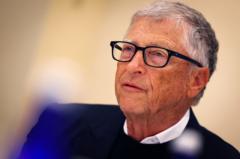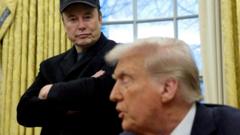Bill Gates announces his intention to give away 99% of his fortune over the next two decades, citing a moral obligation to contribute positively to society. His foundation has already invested heavily in health and development projects and aims to tackle preventable diseases, infectious diseases, and global poverty. Gates expresses concern over decreasing foreign aid budgets and criticizes fellow billionaire Elon Musk for cuts affecting vulnerable populations.
Bill Gates to Donate 99% of Wealth by 2045: A Transformative Philanthropic Pledge

Bill Gates to Donate 99% of Wealth by 2045: A Transformative Philanthropic Pledge
The Microsoft co-founder accelerates his charitable commitments and plans to end his foundation's operations by 2045.
Bill Gates, the co-founder of Microsoft, has declared his ambitious plan to donate 99% of his wealth within the next two decades. In a recent blog post, Gates is determined to reshape his legacy and ensure he is not remembered merely as a wealthy man. He expressed his resolve to accelerate his philanthropic efforts through the Bill & Melinda Gates Foundation, which he plans to dissolve by 2045.
Currently worth approximately $108 billion, Gates has already contributed around $100 billion towards various health and development initiatives. He anticipates that the foundation will allocate an additional $200 billion depending on market conditions and inflation over the coming years. Inspired by Andrew Carnegie's 1889 essay "The Gospel of Wealth," Gates emphasized the responsibility of affluent individuals to give back to society. Referencing Carnegie, he stated, "the man who dies thus rich dies disgraced."
This latest announcement marks a significant shift in Gates' charitable approach, as he and his ex-wife Melinda initially intended for the foundation to operate for decades beyond their lifetimes. Although relinquishing 99% of his fortune could still maintain him among the billionaires, it reflects a conscious effort to encourage others to prioritize philanthropy.
In his blog, Gates shared a visual representation of his wealth that depicted a downward trajectory towards zero by 2045. He also specified that the foundation would fund various missions, including eliminating preventable diseases that disproportionately affect mothers and children, eradicating infectious diseases like malaria and measles, and reducing poverty on a global scale.
Gates voiced his views on the diminishing foreign aid budgets in wealthy nations, expressing concern over the implications for impoverished communities. He highlighted the necessity for continued support from affluent countries, stating that the Gates Foundation would remain committed to aiding nations in overcoming poverty.
In a consequential dialogue with the Financial Times, Gates criticized billionaire Elon Musk for his influence on reductions to U.S. aid budgets that he believes have harmed vulnerable populations. Citing recent cancellations of funding to a hospital in Mozambique, Gates urged Musk to witness firsthand the consequences of these budget cuts, which he argues exacerbate the suffering of children afflicted with diseases, including HIV.
These developments prompt a deeper conversation on the ethical responsibilities of wealthy individuals and the broader implications of philanthropy on global health and societal welfare. As Gates implements his plan, observers will be watching closely to assess the impact of such a significant philanthropic wave.



















